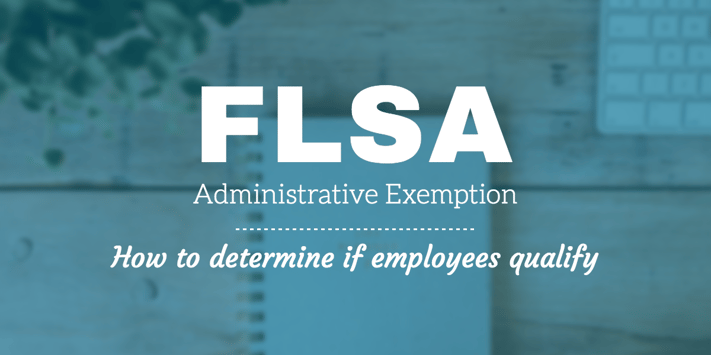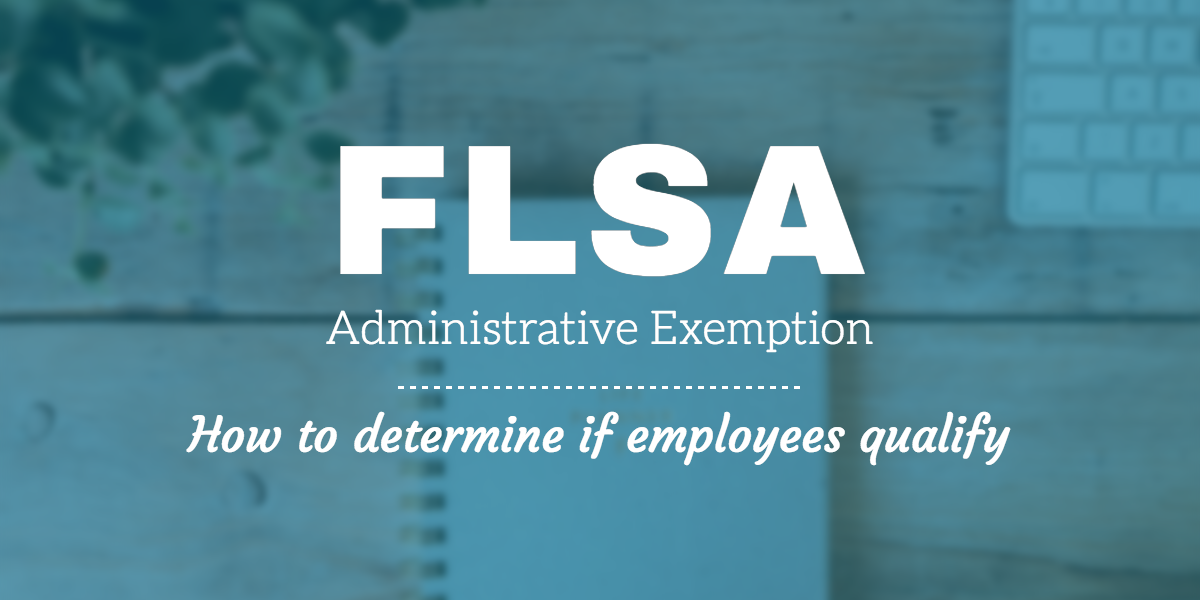Update: As of July 1, 2024 changes have been implemented to the Fair Labor Standards Act. For most up to date information, visit the Department of Labor website or schedule a consultation with Fuse.

When classifying employees according to Fair Labor Standards Act (FLSA) guidelines, there are several possible criteria for exemption, so you must consider each position carefully.
Unfortunately, there is no shortcut for determining FLSA classifications. But when you understand how to apply the relevant criteria to your workforce, you can make more accurate decisions about employee eligibility for overtime and other FLSA entitlements.
Current FLSA Guidelines
The Fair Labor Standards Act sets the federal standard for working hours and pay, so it is critical to ensure you are familiar with your requirements under the law. One major requirement of the FLSA is the need to pay overtime to eligible employees who work more than 40 hours per week. Failing to pay overtime can result in costly Department of Labor (DOL) fines on top of owed back pay.
When hiring and managing employees, you also need to keep pace with periodic changes in FLSA requirements. For example, in January 2020, the Department of Labor increased the salary level for determining overtime eligibility from $455 per week to $684 per week ($35,568 per year).
However, salary is not the only determining factor when considering exemption from overtime. You also need to review each employee’s job duties and determine if any of the following FLSA exemptions apply:
- Administrative exemption
- Computer employee exemption
- Executive exemption
- Learned professional exemption
- Outside sales exemption
This article covers the administrative exemption under the FLSA and how you can apply it in your workforce. But first, it is necessary to review the core concepts of FLSA status and what it means to be exempt or non-exempt.
How to Classify Employees Under the FLSA
An employee who is classified as non-exempt is covered under the entitlements of the FLSA and has the right to overtime and a minimum wage. Conversely, an employee who is classified as exempt is not covered by the FLSA and is not entitled to overtime pay or a minimum wage.
Three factors determine an employee’s FLSA status: salary level, salary basis, and duties performed. Employees are considered FLSA exempt if all three of the following exemptions are true:
- They receive compensation on a salary basis (not hourly).
- They earn at least $684 per week ($35,568 per year).
- They perform exempt job duties.
When any of the above exemptions do not apply to an employee, the employee is considered non-exempt. However, the determination is not always so cut and dry. When considering an employee’s job duties, there are special cases that could make them FLSA exempt even if the salary basis and level match the non-exempt qualifications.
What Is the Administrative Exemption?
An administrative exemption is possible when an employee is paid on a salary basis, earns above the FLSA exemption threshold weekly or annually, and performs primary job duties in the following categories:
- Performs office or non-manual work directly related to business operations or management.
- Exercises independent judgment and discretion.
- Supports production or works as a line employee that keeps the business running, without engaging in the production or sales of the actual product or service of the business.
One allowable exception to the job duty requirements above applies to highly-compensated employees (HCEs). Employees who meet the following criteria established by the DOL are considered HCEs and are classified as FLSA exempt:
- Perform office or non-manual work.
- Receive total annual compensation of $107,432 or more (which must include at least $684 per week on a salary or fee basis).
- Regularly perform at least one of the duties of an exempt executive, administrative, or professional employee.
- Human resources
- Payroll
- Benefits management
- Marketing
- Public relations
- Certain computer-related jobs (learn about the FLSA Computer Exemption here)
Note that, as with other exemptions, an employee’s job title does not determine exemption. For example, as one employment lawyer told the Society for Human Resource Management, “[The] term [coordinator] is often overused and often covers employees who lack a sufficient amount of discretion and independent judgment to satisfy the administrative exemption." However, in a 2020 opinion letter, the DOL ruled that a local government's emergency-management “coordinators” did indeed meet the administrative exemption.
Examples of the Administrative Exemption
Given the reality that two seemingly similar positions may not carry the same FLSA classification, it can be helpful to consider some real-world scenarios of how you would apply the administrative exemption in your organization. Here are a few examples to help you:
HR Professionals
Many human resources and benefits management positions fall under the administrative exemption because their primary duties involve interpreting and implementing company policies and making decisions on behalf of the company.
However, not all HR positions meet the requirements for the administrative exemption. For example, recruitment clerks who screen job candidates for minimum requirements would likely not meet the exemption criteria. They typically do not set the standards for review or make higher-level hiring decisions requiring independent judgment, unlike hiring managers or HR managers.
Administrative Employees
Simply working in an administrative function or having a title such as “administrative manager” or “administrative assistant” does not determine an employee’s FLSA exemption.
For example, an executive assistant working for a business owner or senior executive may meet the duties requirements for the administrative exemption if the position carries the authority to make decisions, use judgment, and manage non-manual processes. Conversely, an administrative assistant who primarily performs manual office tasks would not meet the duties requirement for the administrative exemption.
Non-Executive Managers
Employees who lead others in completing projects, sales, and tasks that support business operations are likely to meet the administrative exemption. It is not a matter of job level within the organization, as the exemption could apply to supervisors who do not have formal reporting lines with those employees. Rather, the employee’s independent decision-making and role in designing, directing, and implementing the team's work results in an administrative exemption.
Simplify FLSA Classifications
Determining a position’s administrative exemption is easier when you understand the job duties requirements and apply them consistently. And remember: Taking the time to classify employees the right way now will avoid misclassification penalties later.
To learn more about FLSA exemption and how to apply it in your workforce, read our Guide to FLSA Status & Changes to Overtime Rules.
Originally published August 22, 2017 updated August 19, 2021.

